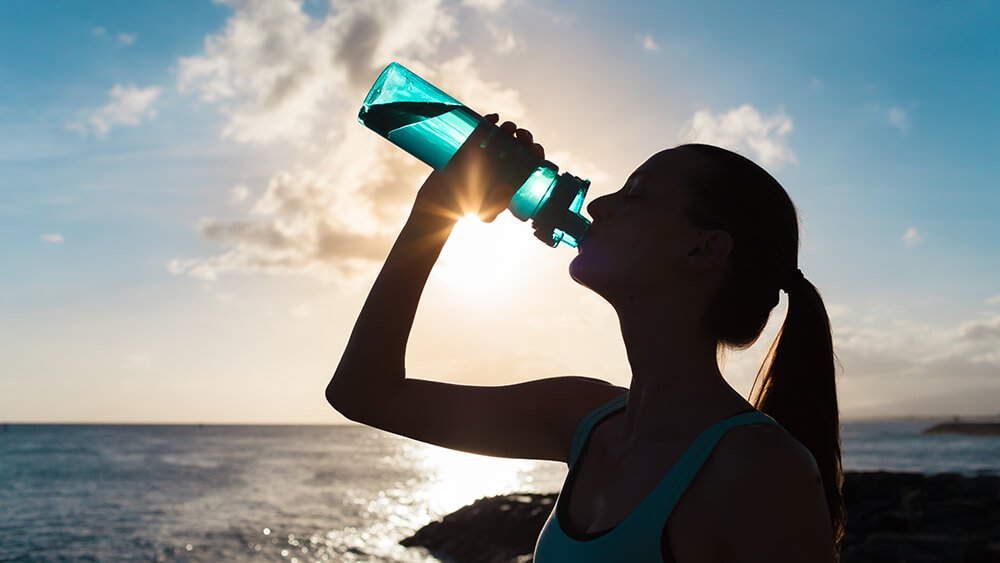
Hydration is of paramount importance when it comes to fitness routines. Whether you’re engaging in cardiovascular exercises, weightlifting, or any other physical activity, maintaining proper hydration levels is crucial for optimal performance and overall well-being. During exercise, your body loses water through sweat, and if this fluid loss is not replenished, it can lead to dehydration.
Hydration plays several key roles in supporting your fitness goals. Firstly, it helps regulate body temperature, preventing overheating and heat-related illnesses. Additionally, adequate hydration enhances physical performance, allowing you to sustain energy levels, endurance, and focus. It also helps prevent muscle cramps by maintaining electrolyte balance and supports joint health by providing lubrication. Furthermore, staying hydrated facilitates the delivery of nutrients to your muscles and aids in the removal of waste products.
Proper hydration also promotes cardiovascular health and has long-term benefits for your overall health and well-being. By prioritizing hydration in your fitness routine, you can optimize your performance, prevent injuries, and ensure a more enjoyable and effective workout experience.
What are Indications of Dehydration?
Dehydration can have various indications, and recognizing these signs is important for addressing and preventing further complications. Here are some common indications of dehydration:
- Thirst: Feeling thirsty is one of the initial signs of dehydration. It serves as a signal from your body that it needs more fluids.
- Dry mouth and lips: When you’re dehydrated, your mouth and lips may feel dry and sticky. Saliva production decreases, resulting in a parched sensation.
- Dark-colored urine: Monitoring the color of your urine can provide valuable insights into your hydration status. Dehydration often leads to a darker urine color, indicating concentrated waste products due to insufficient fluid intake.
- Infrequent urination: Inadequate fluid intake can result in reduced urine production. If you notice that you are urinating less frequently than usual or in smaller amounts, it may be a sign of dehydration.
- Fatigue and dizziness: Dehydration can cause feelings of fatigue, weakness, and dizziness. Without sufficient fluids, your body may struggle to maintain energy levels and proper blood circulation.
- Headaches: Dehydration can contribute to headaches and migraines. It is important to note that headaches can have multiple causes, but dehydration is one potential factor.
- Dry skin: When you’re dehydrated, your skin may appear dry, less elastic, and lacking moisture. It may also feel rough to the touch.
- Muscle cramps: Inadequate fluid and electrolyte balance can lead to muscle cramps and spasms, particularly during physical activity. Dehydration affects the proper functioning of muscles and can contribute to increased muscle fatigue and discomfort.
- Increased heart rate: Dehydration can cause an increase in heart rate as the body tries to compensate for decreased blood volume. This increased heart rate may be noticeable during rest or physical exertion.
- Impaired cognitive function: Dehydration can affect cognitive abilities, leading to difficulties in concentration, focus, and memory. You may feel mentally foggy or experience difficulties with decision-making.
It’s important to note that these signs can vary in severity depending on the extent of dehydration. If you experience severe symptoms such as extreme thirst, rapid heartbeat, confusion, or fainting, it may indicate severe dehydration or other medical conditions. In such cases, seeking medical attention is crucial.
Why is Hydration Important During Exercise?
Hydration is crucial during exercise for several reasons:
- Regulating body temperature: When you exercise, your body temperature rises, and you start to sweat to cool down. Sweating is the body’s natural cooling mechanism, but it leads to fluid loss. By staying hydrated, you replenish the lost fluids and help regulate your body temperature, preventing overheating and heat-related illnesses.
- Maintaining performance and energy levels: Dehydration can significantly impact your performance and energy levels during exercise. Even mild dehydration, as low as 2% loss in body weight, can impair physical and cognitive functions, such as endurance, strength, coordination, and focus. By staying properly hydrated, you can optimize your performance, maintain stamina, and delay the onset of fatigue.
- Preventing muscle cramps and injuries: Dehydration increases the risk of muscle cramps during exercise. When you sweat, you not only lose water but also essential electrolytes like sodium, potassium, and magnesium, which play a crucial role in muscle function. Adequate hydration helps maintain the electrolyte balance, reducing the chances of muscle cramps and improving muscle performance. It also supports joint health by providing lubrication, reducing the risk of joint discomfort and injuries.
- Facilitating nutrient delivery and waste removal: Water is essential for the transportation of nutrients to the cells and the removal of waste products. During exercise, your body requires a sufficient supply of nutrients to support energy production, muscle repair, and recovery. Hydration ensures that nutrients are effectively delivered to the muscles, helping them perform optimally and recover efficiently post-workout. It also aids in the removal of metabolic waste products, such as lactic acid, reducing muscle soreness and promoting faster recovery.
- Supporting cardiovascular health: Exercise places additional demands on your cardiovascular system. When dehydrated, your blood volume decreases, making it harder for your heart to pump oxygen and nutrients to the muscles. Proper hydration helps maintain adequate blood volume, promoting cardiovascular health and ensuring efficient oxygen and nutrient delivery to working muscles.
- Enhancing overall well-being: Beyond the immediate effects on exercise performance, staying hydrated has numerous long-term health benefits. It helps maintain healthy skin, aids digestion, promotes kidney function, and supports cognitive function. When you’re properly hydrated, you feel more energized, focused, and motivated, enabling you to enjoy your fitness routine and achieve your goals.
To ensure optimal hydration during exercise, it is recommended to drink fluids before, during, and after your workout, listen to your body’s thirst cues, and be mindful of environmental factors like heat and humidity, which increase fluid loss.
Tips to Stay Hydrated in Fitness Routine
Staying hydrated during your fitness routine is vital for optimal performance and overall well-being. Here are some tips to help you maintain proper hydration:
- Drink water before, during, and after exercise: Start your workout hydrated by consuming water beforehand. During your routine, take regular breaks to sip water and replenish fluids. Afterward, continue hydrating to restore any lost fluids.
- Monitor your fluid intake: Pay attention to the amount of water you consume throughout the day. Aim to drink enough fluids to keep your urine pale yellow or clear, which is an indication of good hydration.
- Hydrate before intense workouts: If you’re engaging in a particularly intense or long workout session, consider pre-hydrating by consuming fluids in the hours leading up to it. This can help you start off adequately hydrated.
- Choose the right beverages: While water is generally the best choice for hydration, especially for shorter workouts, you may benefit from electrolyte-rich beverages for longer or more intense activities. These can help replenish electrolytes lost through sweat. Consider sports drinks, coconut water, or homemade electrolyte solutions.
- Snack on hydrating foods: Include hydrating foods in your pre- and post-workout snacks. Fruits and vegetables with high water content, such as watermelon, cucumbers, oranges, and berries, can contribute to your overall hydration.
- Be mindful of environmental factors: Adjust your hydration strategy based on the environmental conditions. In hot and humid weather, you’ll likely sweat more, so increase your fluid intake accordingly.
- Use a reusable water bottle: Carry a reusable water bottle with you during your workouts to ensure easy access to fluids. It’s a convenient reminder to stay hydrated and reduces waste from single-use plastic bottles.
- Set hydration reminders: If you tend to forget to drink water during exercise, set reminders on your phone or use fitness apps that include hydration tracking features. These reminders can help you stay on top of your fluid intake.
- Listen to your body: Pay attention to your body’s thirst cues and drink water whenever you feel thirsty. Thirst is a signal that your body needs fluids, so don’t ignore it.
- Educate yourself on your specific fluid needs: Fluid requirements can vary depending on factors like the intensity and duration of your workouts, as well as individual factors such as body weight and sweat rate. Consider consulting a healthcare professional or sports nutritionist to get personalized recommendations.
Remember, staying hydrated is not just about drinking water during your workouts. It’s a continuous process throughout the day, and maintaining proper hydration levels will support your fitness goals and overall health.
Conclusion
In conclusion, maintaining proper hydration during your fitness routine is essential for optimal performance, preventing dehydration, and supporting overall well-being. Hydration plays a vital role in regulating body temperature, enhancing performance and energy levels, preventing muscle cramps and injuries, facilitating nutrient delivery, supporting cardiovascular health, and promoting overall health and cognitive function.
To stay hydrated during your fitness routine, make sure to drink water before, during, and after exercise, monitor your fluid intake, choose the right beverages such as water or electrolyte-rich drinks, snack on hydrating foods, be mindful of environmental factors, use a reusable water bottle, set hydration reminders, listen to your body’s thirst cues, and educate yourself on your specific fluid needs.
By prioritizing hydration in your fitness routine, you can optimize your performance, prevent complications associated with dehydration, and enjoy a more effective and enjoyable workout experience. Remember, staying hydrated is a continuous process throughout the day, so make it a habit to maintain proper hydration levels for overall health and fitness success.
